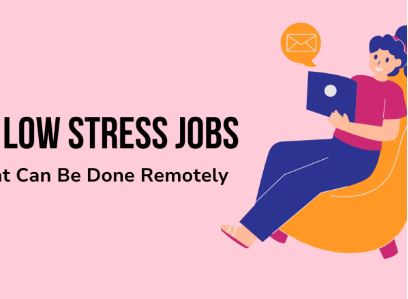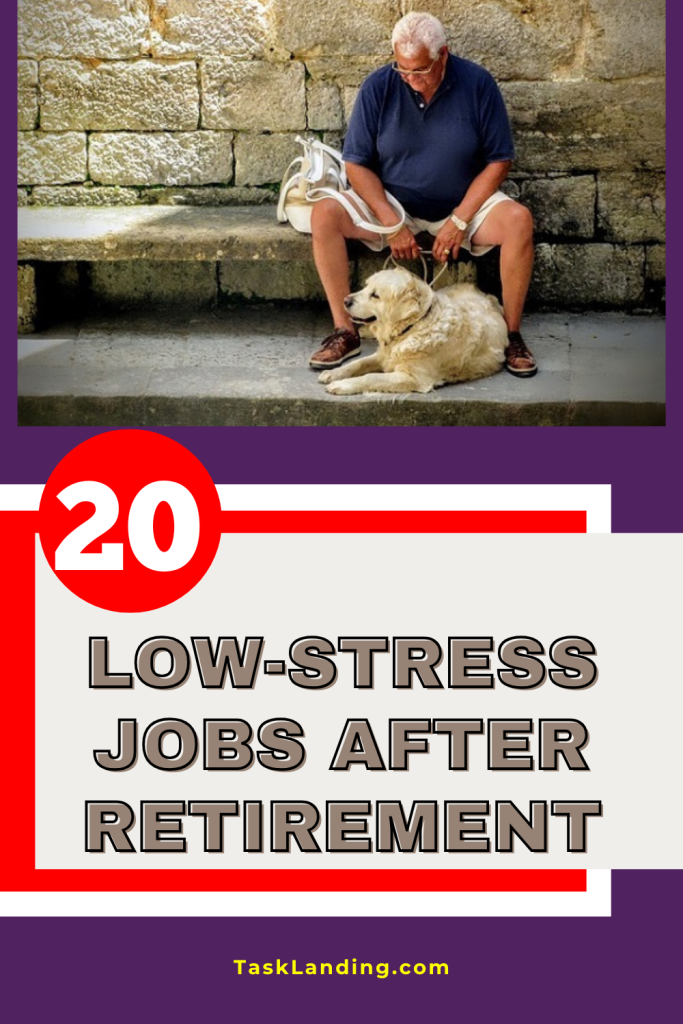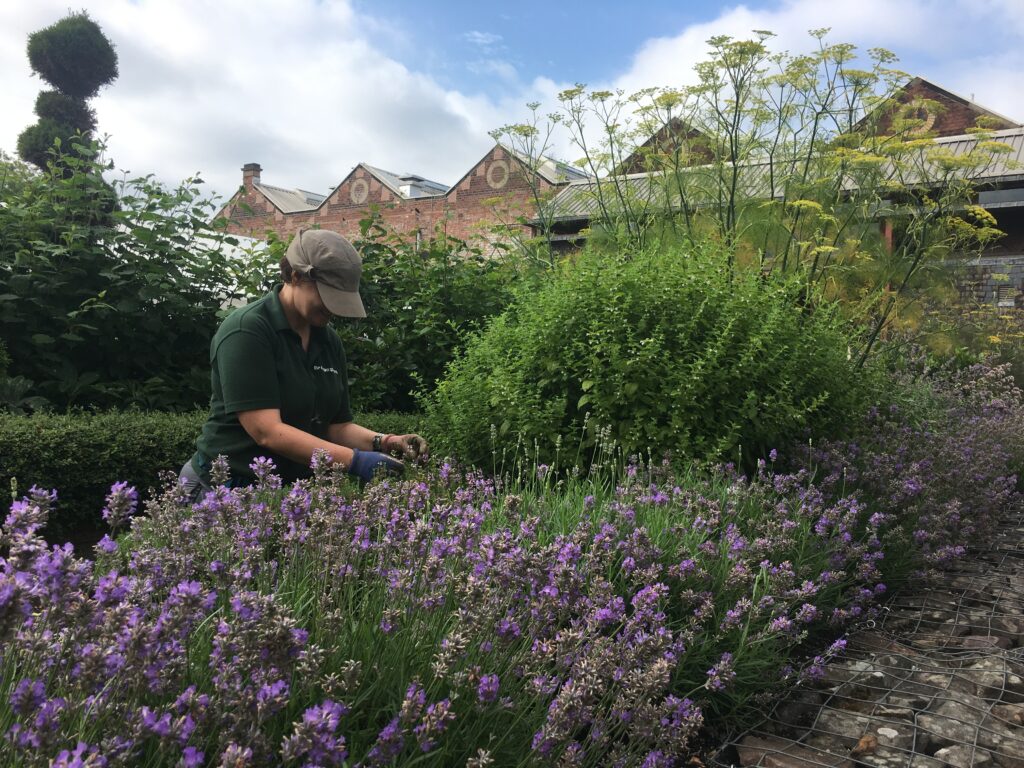Retirement is a time many look forward to—a well-deserved phase after years of hard work. But even after officially “retiring,” many people seek ways to stay active, pursue passions, and bring in additional income. Low-stress jobs after retirement offer the perfect balance: they allow retirees to remain engaged and earn extra money without overwhelming demands.
In this guide, I’ll discuss the characteristics of low-stress jobs, why they’re beneficial and offer 20 ideal options to consider.
Many jobs are flexible enough to allow you to travel, spend time with family, or engage in other hobbies.
What is a Low-Stress Job?

A low-stress job has minimal demands, allowing you to work at your pace without intense pressure. The following are the main characteristics of low-stress jobs:
Flexibility – These jobs often offer part-time hours or the ability to work from home, allowing you to balance work with leisure and personal time.
Low Physical Demands – Physical requirements are usually minimal, making these jobs ideal for those who avoid heavy lifting or strenuous activities.
Limited Decision-Making Pressure – Unlike high-stakes careers, these jobs don’t involve major decision-making, deadlines, or high pressure.
The key is to find work that fits your interests and lifestyle, giving you the freedom to enjoy retirement without high-stress obligations.
Why Consider Low-Stress Jobs After Retirement?
As a retiree, you may seek a job for various reasons beyond income. Here are a few reasons why low-stress jobs are particularly appealing:
Staying Mentally Engaged: Retirement can sometimes lead to a feeling of stagnation, especially for those who enjoy the challenges of their careers. Low-stress work can help keep your mind sharp and engaged.
Improving Physical Health: Jobs that involve light physical activity, such as dog walking or gardening, provide the physical exercise needed to maintain health as you age.
Boosting Financial Security: Many retirees work to supplement their pensions or savings, especially as people live longer and costs increase. Low-stress jobs offer this without overwhelming time commitments.
Fostering Social Connections: Jobs with social aspects, like tutoring or working in a community center, help maintain social connections, which is beneficial for mental health.
These jobs allow retirees to enjoy a balanced life without the high stakes of previous careers.
Examples of Low-Stress Jobs After Retirement

Below is a list of 20 low-stress jobs you can consider. Each one has its appeal, and many allow for part-time or flexible scheduling.
1. Freelance Writing or Editing
Freelance writing and editing are ideal for retirees with strong writing skills or experience in publishing. As a freelancer, you can work from home, set your hours, and choose projects that interest you.
- Benefits: Freelancing allows retirees to set their schedules and even explore different types of writing, such as blogging, technical writing, or copyediting.
- Earning Potential: Freelancers can earn well depending on experience and niche. Writers who specialize in fields like finance, law, or healthcare may earn a higher hourly rate.
Compare: 51 Freelance Writing Jobs from Home
2. Tutoring or Teaching
With experience in a specific subject or teaching background, retirees can work as tutors.
Online platforms like VIPKid allow you to teach English, while local tutoring opportunities are available for various subjects.
- Benefits: You can set your schedule and choose whether you’d like to work online or in person.
- Social Aspect: Tutoring allows you to engage directly with students, providing a sense of connection and purpose.
3. Consulting
If you have specialized skills, consulting is an ideal low-stress job for you. Consultants are in demand in fields like finance, law, healthcare, and business.
- Autonomy: Consultants often work independently, giving retirees the flexibility to take on projects selectively.
- Earning Potential: Consulting can be highly lucrative, especially for professionals with years of experience in a niche field.
4. Pet Sitting or Dog Walking
If you love animals, pet sitting and dog walking are enjoyable ways to spend time with furry friends.
Websites like Rover and Wag! connect you with pet owners in need of caregivers.
- Physical Activity: Dog walking is beneficial for your health, as it requires regular, light exercise.
- Flexibility: You can control the number of clients you accept, making it a very flexible job.
5. Receptionist or Greeter

Many businesses, including hospitals, museums, and offices, hire part-time receptionists and greeters to welcome visitors.
This role involves minimal stress and offers a predictable, often part-time schedule.
- Interaction: The job is usually people-focused, allowing retirees to interact with visitors and provide information.
- Calm Environment: This role tends to be in calm settings, ideal for those who prefer low-stimulation environments.
6. Library Assistant
Working in a library as an assistant offers a quiet, serene environment perfect for retirees who appreciate calm surroundings.
Responsibilities may include organizing books, assisting patrons, and helping with library events.
- Perks: This job often includes access to library resources and special events.
- Intellectual Engagement: You get to surround yourself with books and learning materials, making it ideal for intellectually curious retirees.
7. Museum Guide or Docent
If you’re interested in history, art, or science, consider becoming a museum guide or docent. This role allows you to share knowledge and engage with visitors without the demands of a traditional job.
- Learning and Sharing: Many museums provide training, so you can learn more about exhibits and share your enthusiasm with others.
- Flexibility: These roles are often part-time and may include volunteer opportunities that could later lead to paid positions.
8. Event Staff
Event staff help manage conferences, sports events, or exhibitions, taking on roles like ushering, checking tickets, or providing information. This work is low-stress and allows you to be social in a lively setting.
- Perks: Many event staff get to attend interesting events as part of their job.
- Scheduling Flexibility: Events are often on weekends or evenings, allowing for a flexible schedule.
9. Retail Associate
Part-time retail roles are an excellent fit for retirees, especially in stores that align with their interests, like bookstores or garden centers.
Retail jobs are generally low-stress if you choose the right setting.
- Physical Activity: You’re on your feet, which can be beneficial for maintaining mobility.
- Employee Discounts: Many retail positions offer discounts, which can be an added perk.
10. Gardening Assistant

If you love working with plants, becoming a part-time gardening assistant is a rewarding choice. It allows you to enjoy fresh air and nature, working in either private gardens or public parks.
- Health Benefits: Gardening has been shown to reduce stress and improve mood.
- Flexibility: Many gardening jobs are seasonal, allowing for breaks in the off-season.
11. Virtual Assistant
Virtual assistants provide remote support for businesses by handling administrative tasks like scheduling, emails, and document preparation.
It’s an ideal choice for retirees who enjoy structured, behind-the-scenes work.
- Remote Work: Virtual assistants work entirely from home, providing maximum flexibility.
- Earning Potential: Experienced VAs can earn a solid hourly rate, depending on their skills and client needs.
12. Tax Preparation Assistant
Tax preparation is a seasonal job that’s especially popular from January to April.
Many firms offer short-term training for those who don’t have tax experience, making it accessible.
- Seasonal Work: This allows for predictable work and income during tax season, leaving the rest of the year free.
- High Pay: Tax preparation roles can offer competitive wages, especially for certified preparers.
13. Hotel Concierge

For retirees who enjoy hospitality, working as a hotel concierge is a social, rewarding role that involves assisting guests with travel plans, local dining recommendations, and general advice.
- Interaction: This role offers social interaction without a high workload.
- Potential Perks: Concierges often receive discounts or complimentary access to local attractions.
14. Tour Guide
Tour guides get to share their passion for a place’s history or culture. Whether leading city tours, food tours, or nature walks, this role keeps you active and engaged with visitors.
- Health and Activity: Walking or hiking as part of tours provides light exercise.
- Social Engagement: Sharing stories and interacting with tourists can be highly rewarding.
15. Home Organizer
Home organizing is a growing field for retirees who enjoy decluttering and creating functional spaces. This job is project-based, allowing you to work as much or as little as you like.
- Project-Based: You can take on as many or as few clients as you want, providing flexibility.
- Creative Outlet: Organizing homes can be a fun way to use creativity while helping others.
16. Online Sales

Selling handmade goods, crafts, or vintage finds online is perfect for retirees who enjoy creating or collecting.
Platforms like Etsy or eBay make it easy to manage an online store.
- Low Overhead: Many online selling platforms are low-cost to start, so you can begin with minimal investment.
- Flexible Hours: You can work on your store at your own pace, managing inventory and shipping when convenient.
17. Nonprofit Volunteer (with Stipends)
Many nonprofits offer stipend-based volunteer roles, especially for retirees willing to contribute time to worthy causes like environmental work, tutoring, or event planning.
- Giving Back: Volunteer work provides a strong sense of purpose.
- Supplemental Income: Some nonprofits offer small stipends or reimbursement for expenses.
18. Fitness Instructor
If you’re passionate about health, consider becoming a part-time fitness instructor for seniors. Many gyms and senior centers offer programs like yoga, walking groups, or gentle exercise classes.
- Active Lifestyle: Instructing fitness classes keeps you in shape while inspiring others.
- Flexible Schedule: Many classes are part-time, making it easy to create a schedule that fits your lifestyle.
19. Content Creator or Blogger
If you have a passion or area of expertise, consider creating content around it.
Starting a blog or YouTube channel allows you to share your knowledge, whether it’s about travel, cooking, gardening, or another hobby.
- Creativity: Content creation is an opportunity to express yourself.
- Passive Income: As your platform grows, you could earn passive income through ads, sponsorships, or affiliate marketing.
20. Babysitting or Childcare

For retirees who enjoy children, part-time babysitting or childcare is a rewarding way to earn extra income.
Many families seek experienced caregivers for after-school care or occasional evenings.
- Flexible Hours: You can choose families that match your availability.
- Social Benefit: Spending time with children is engaging and enjoyable for those who like being around kids.
Tips For Landing Low Stress High Paying Jobs
Landing a low-stress, high-paying job requires strategic planning, skill development, and sometimes a shift in perspective on career paths. Here are some actionable tips to help:
Identify Industries Known for Low-Stress Jobs
Look for industries that are stable and offer job security without a high-pressure environment.
For example, technology, consulting, healthcare (in non-patient-facing roles), and education often offer roles that can be low-stress but still pay well.
Some high-paying, lower-stress positions include data analysis, technical writing, user experience (UX) design, software development, and corporate training.
Develop In-Demand Skills
Skills like data analysis, digital marketing, project management, UX/UI design, and software development are highly valued and often come with flexible, low-stress work environments.
Certification in areas like data science, cloud computing, or digital marketing can help, as these fields tend to offer remote and flexible work options.
Look for Remote or Flexible Opportunities
Remote work is often less stressful because of the flexibility it offers, as well as the ability to work from your preferred environment.
Remote or hybrid roles are common in tech, marketing, and writing/editing jobs.
Flexible schedules allow you to work during hours when you’re most productive, reducing stress and improving work-life balance.
Focus on Niche Specializations
Specializing in niche areas like cybersecurity, financial planning, or data privacy can make you highly valuable, enabling you to command a higher salary while often working independently.
Being a subject-matter expert in a specific field (e.g., intellectual property law, medical coding, etc.) can increase job stability and often comes with lower stress than generalist roles.
Prioritize Company Culture
Low-stress jobs often come from companies with supportive, inclusive cultures that value employee well-being.
Research companies that emphasize work-life balance, mental health support, and offer flexibility.
During interviews, ask about the work environment, team dynamics, and policies around work-life balance to gauge whether the company culture aligns with a low-stress philosophy.
Utilize Networking and Personal Branding
Building a strong network can help you find high-paying jobs that are never posted publicly.
A personal brand on LinkedIn that highlights your skills and experience can also attract recruiters for roles that fit your stress and pay criteria.
Networking within industry groups or attending conferences can put you in touch with hiring managers in niche fields who value experience and may offer flexible work conditions.
Negotiate Work Conditions
Many people focus only on salary when negotiating, but job conditions (such as remote options, flexible hours, and clear boundaries around after-hours communication) are just as important in reducing stress.
Negotiating for flexible hours, reduced weekend work, or fewer on-call responsibilities can make a high-paying role more manageable and enjoyable.
Research Company Benefits Beyond Salary
Seek roles that provide great health benefits, ample vacation time, and professional development opportunities. These perks can reduce stress by supporting your overall well-being.
Companies with strong retirement benefits or profit-sharing can also make a job feel more rewarding and financially secure, allowing you to focus less on day-to-day stress.
Avoid High-Turnover Roles
High-turnover roles are often a sign of a stressful environment. When researching companies or industries, check turnover rates or read employee reviews to get a sense of job satisfaction and stress levels.
Sites like Glassdoor and Indeed offer insights from employees on work culture, stress levels, and management styles, which can help you avoid roles that may look attractive but are high-stress.
Prioritize Roles with Autonomy
Jobs that allow for independent work and decision-making often have lower stress than those with constant supervision or micromanagement.
Look for roles with project-based work where you can set your own pace.
Freelance and consulting roles, for instance, often give you control over your workload, which can lead to lower stress if you manage your time well.
By identifying roles that align with your strengths, negotiating work conditions, and leveraging a strong professional network, you can increase your chances of landing a well-paying, low-stress job that aligns with your lifestyle and career goals.
Frequently Asked Questions (FAQs)
Q: What is the best job for a retired person?
A: The best job depends on personal interests and lifestyle. Popular low-stress options include tutoring, pet sitting, and consulting.
Q: What job pays the most with the least stress?
A: Consulting roles and tax preparation during tax season can offer high pay with manageable stress.
Q: What is the easiest job for a senior?
A: Many seniors find receptionist roles, pet sitting, or library assistant jobs easy and enjoyable.
Q: How do I make a living after retirement?
A: Consider part-time roles, freelancing, or consulting based on your expertise. Passive income from investments or rental properties can supplement income.
Summary
Finding a low-stress job after retirement is about balancing income with enjoyment and well-being. Jobs like tutoring, freelancing, and pet sitting allow you to stay active without high demands.
By exploring various roles, you’ll discover flexible options that suit your interests and provide a meaningful way to spend retirement.











